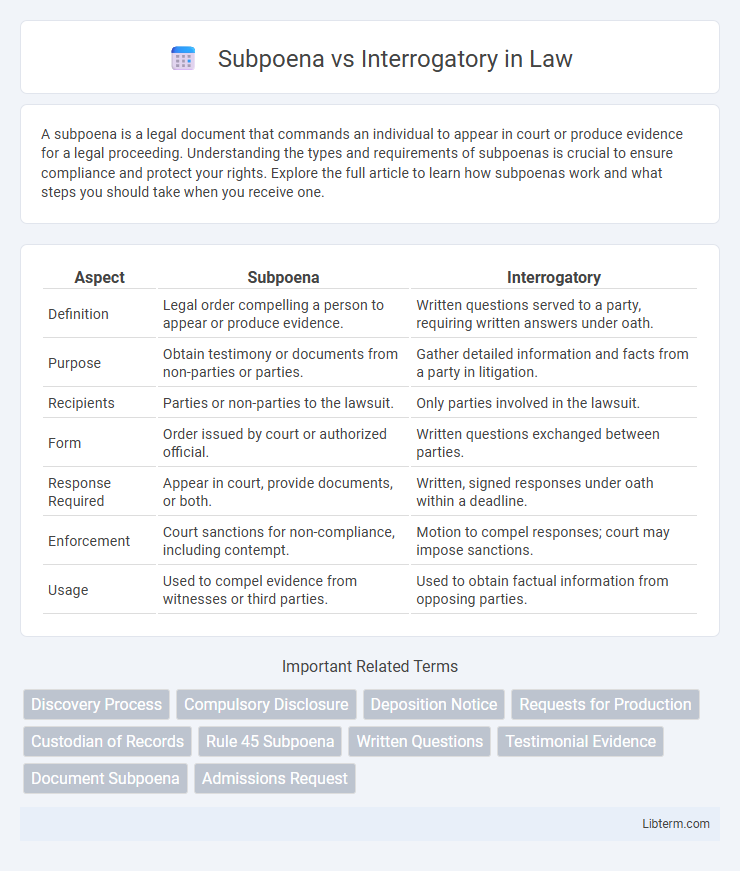A subpoena is a legal document that commands an individual to appear in court or produce evidence for a legal proceeding. Understanding the types and requirements of subpoenas is crucial to ensure compliance and protect your rights. Explore the full article to learn how subpoenas work and what steps you should take when you receive one.
Table of Comparison
| Aspect | Subpoena | Interrogatory |
|---|---|---|
| Definition | Legal order compelling a person to appear or produce evidence. | Written questions served to a party, requiring written answers under oath. |
| Purpose | Obtain testimony or documents from non-parties or parties. | Gather detailed information and facts from a party in litigation. |
| Recipients | Parties or non-parties to the lawsuit. | Only parties involved in the lawsuit. |
| Form | Order issued by court or authorized official. | Written questions exchanged between parties. |
| Response Required | Appear in court, provide documents, or both. | Written, signed responses under oath within a deadline. |
| Enforcement | Court sanctions for non-compliance, including contempt. | Motion to compel responses; court may impose sanctions. |
| Usage | Used to compel evidence from witnesses or third parties. | Used to obtain factual information from opposing parties. |
Understanding Subpoenas: Definition and Purpose
A subpoena is a legal document issued by a court or authorized body compelling an individual or organization to provide testimony or produce evidence in a legal proceeding. It serves as a critical tool for gathering facts and documents to support or refute claims during litigation. Understanding the subpoena's role ensures compliance with legal obligations and avoids penalties for contempt of court.
What Are Interrogatories? Key Concepts Explained
Interrogatories are written questions sent by one party in a lawsuit to the opposing party, requiring written answers under oath as part of the discovery process. They serve as a tool to gather detailed information, clarify facts, and narrow down issues before trial. Unlike subpoenas, interrogatories specifically target the opposing party's knowledge, ensuring factual clarity and legal accountability in litigation.
Legal Basis: Subpoenas vs. Interrogatories
Subpoenas are legal documents issued under court authority compelling a person to testify or produce evidence, grounded in rules such as the Federal Rules of Civil Procedure Rule 45. Interrogatories are written questions formally served on parties to a lawsuit, governed by Rule 33 of the Federal Rules of Civil Procedure, requiring written answers under oath. The legal basis distinguishes subpoenas as tools for third-party evidence gathering, while interrogatories target direct parties for factual information exchange.
Types of Subpoenas Issued in Litigation
Subpoenas issued in litigation primarily fall into two types: subpoenas ad testificandum, which compel a witness to testify, and subpoenas duces tecum, which require the production of documents or evidence relevant to the case. Subpoenas ad testificandum are used to secure live testimony either in court or at a deposition, while subpoenas duces tecum target tangible items such as records, emails, or physical evidence critical to the discovery process. Understanding these types is essential for effective litigation strategy and ensuring compliance with legal obligations during trial preparation.
Types of Interrogatories Used in Discovery
Interrogatories, a key discovery tool in litigation, include several types such as standard, special, and business interrogatories, each designed to extract specific information. Standard interrogatories are broad and seek general facts, while special interrogatories target detailed inquiries tailored to the case's unique aspects. Business interrogatories focus on corporate parties, uncovering information about operations, contracts, and financial data crucial for comprehensive case evaluation.
How Subpoenas Are Served and Enforced
Subpoenas are served by delivering a legal document compelling a person to testify or produce evidence, typically via personal delivery, certified mail, or a process server. They carry legal authority and non-compliance can result in contempt of court charges, enforceable through fines or warrants. Courts closely monitor the proper service of subpoenas to ensure valid enforcement and protect due process rights.
Responding to Interrogatories: Process and Requirements
Responding to interrogatories involves carefully reviewing each question to ensure accurate and complete answers are provided within the designated timeframe, typically 30 days as mandated by federal and state rules. The responses must be signed under oath, affirming their truthfulness, and objections to questions can be raised if they are irrelevant, vague, or overly burdensome. Proper documentation and legal counsel review are essential to avoid waiver of objections and to ensure compliance with procedural requirements in civil litigation.
Differences in Scope: Subpoena vs. Interrogatory
A subpoena compels the production of documents, testimony, or evidence from non-parties and can enforce attendance at depositions or court hearings. Interrogatories are written questions served exclusively on opposing parties, requiring detailed, sworn written answers within a specified timeframe. The scope of subpoenas is broader, extending beyond parties involved, whereas interrogatories are limited to gathering information directly from the opposing side in litigation.
Legal Consequences of Non-Compliance
Failure to comply with a subpoena can result in contempt of court charges, leading to fines or imprisonment. Ignoring an interrogatory may prompt the court to impose sanctions, such as monetary penalties or adverse inference rulings. Both subpoena and interrogatory non-compliance undermine the discovery process and weaken a party's legal position.
Choosing the Right Discovery Tool: Subpoena or Interrogatory?
Choosing the right discovery tool depends on the scope and target of information sought. Subpoenas compel third parties, such as organizations or individuals not directly involved in the lawsuit, to produce documents or testify, making them essential for acquiring external evidence. Interrogatories are written questions directed to opposing parties in the litigation, ideal for obtaining detailed factual information swiftly and cost-effectively within the confines of the lawsuit.
Subpoena Infographic

 libterm.com
libterm.com